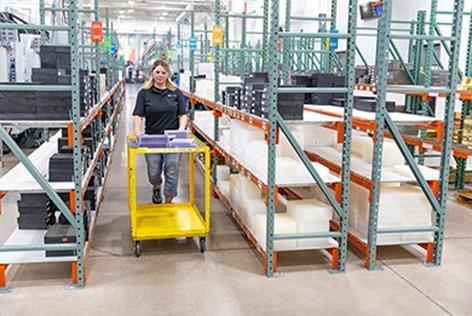Selecting the right material for CNC machining can make all the difference if you want to produce a functional part or prototype at a reasonable price.
How to develop a shortlist
When you are faced with dozens of different datasheets it’s a good idea to prioritise your part’s requirements. Start with what properties it must have and then work your way down to the identifiable nice to haves. This will allow you to sift through the datasheets quickly and shortlist the alternatives down to a manageable number.

Material properties
The first step is to understand what some of the most common material properties are.
Strength. There are lots of different types of strength.
One of the most common is tensile strength. The ultimate tensile strength or UTS is the breaking point under tension. UTS is measured in megapascals or MPa for short or in newtons per square metre. A low strength material would have an MPa of less than 100, while a high strength material would be greater than 400.
Impact resistance or strength could be another important factor and you might also want your part to be hard and to resist wear. Even friction might be important with materials ranging from a high friction to one that has low friction and is self-lubricating.
Wear resistance vs Machinability
At first glance you might think that you need a material that resists wear and/or abrasion, but you need to consider that a hard-wearing material is going to be hard to machine. It will need more time and more tools to produce the part you need, and that means it will cost you more. When you hear the term machinability this is what we mean.
Strength to weight ratio
Strength is important but in modern manufacturing you often need something with a high strength to weight ratio. So, you may need to consider material density or weight as well. Quite simply this, it’s weight to volume ratio, it is often measured in kilograms per metre cubed.
Elasticity
This is the ability of a material to resume its normal shape after stretching or compression. You will find common terms in a material description relating to elasticity with low elasticity referred to as plastic, medium as malleable or tough and high elasticity as stiff or brittle.
Elongation
Elongation refers to the change in length of a part compared to its original size, or its stretchability. You will often see a figure quoting the elongation at break, which is how long it is in relation to its original length when it breaks.
Temperature
The operating temperature is the temperature at which a device operates. With plastics this might be broken down further to their short-term service temperature or what they can withstand over a short period of time measured in minutes or sometimes hours and their long-term service temperature.
You may also need to consider your chosen material’s melting temperature.
Thermal conductivity
This refers to a material’s ability to conduct or transfer heat. For some applications you want thermal conductivity for others you might want to prevent or insulate against it.
Electrical conductivity
The ability of the material to conduct electricity. Good conductors include copper while most plastics are bad conductors or excellent insulators.
Selecting the right material
Clearly material selection can be complex, but with a bit of research you can increase the number of materials you are familiar with. Once you have a longer “go to list” you could save yourself money or find a material that better meets the needs of your part. At Protolabs we have done a lot of that research, hand selecting 30+ of the most popular for you. Choosing a plastic or metal material for CNC machining can be difficult. Keep in mind functionality and any potential secondary operations.
When you upload a CAD model to our website, our quoting tool calculates what can be machined within our capabilities, and what has risk. Its conclusions are clearly spelled out in the quote, giving you a chance to adjust the part design if so desired and spin the quoting wheel again. If you're ever in doubt, however, contact our applications engineers at or customerservice@protolabs.co.uk.